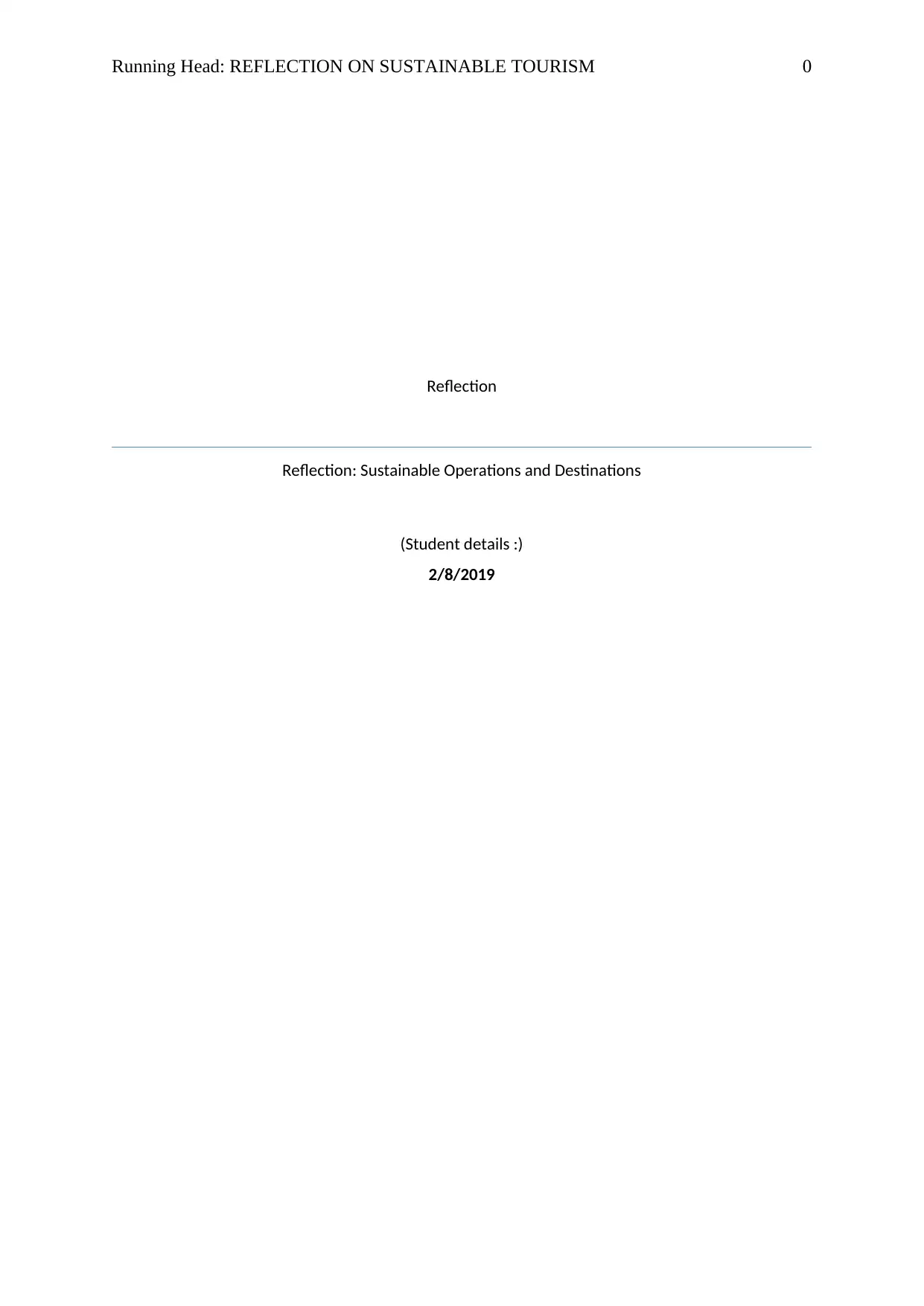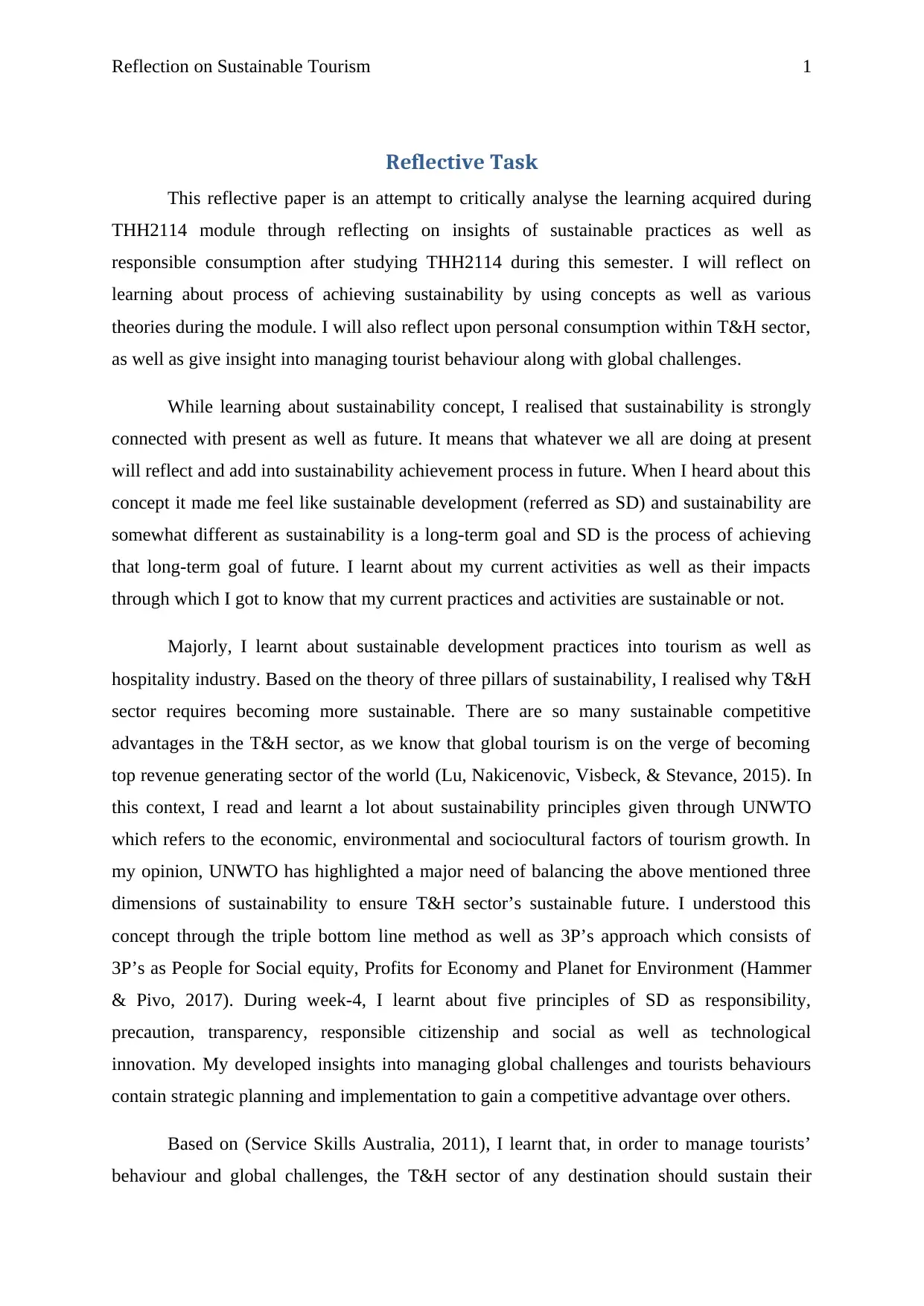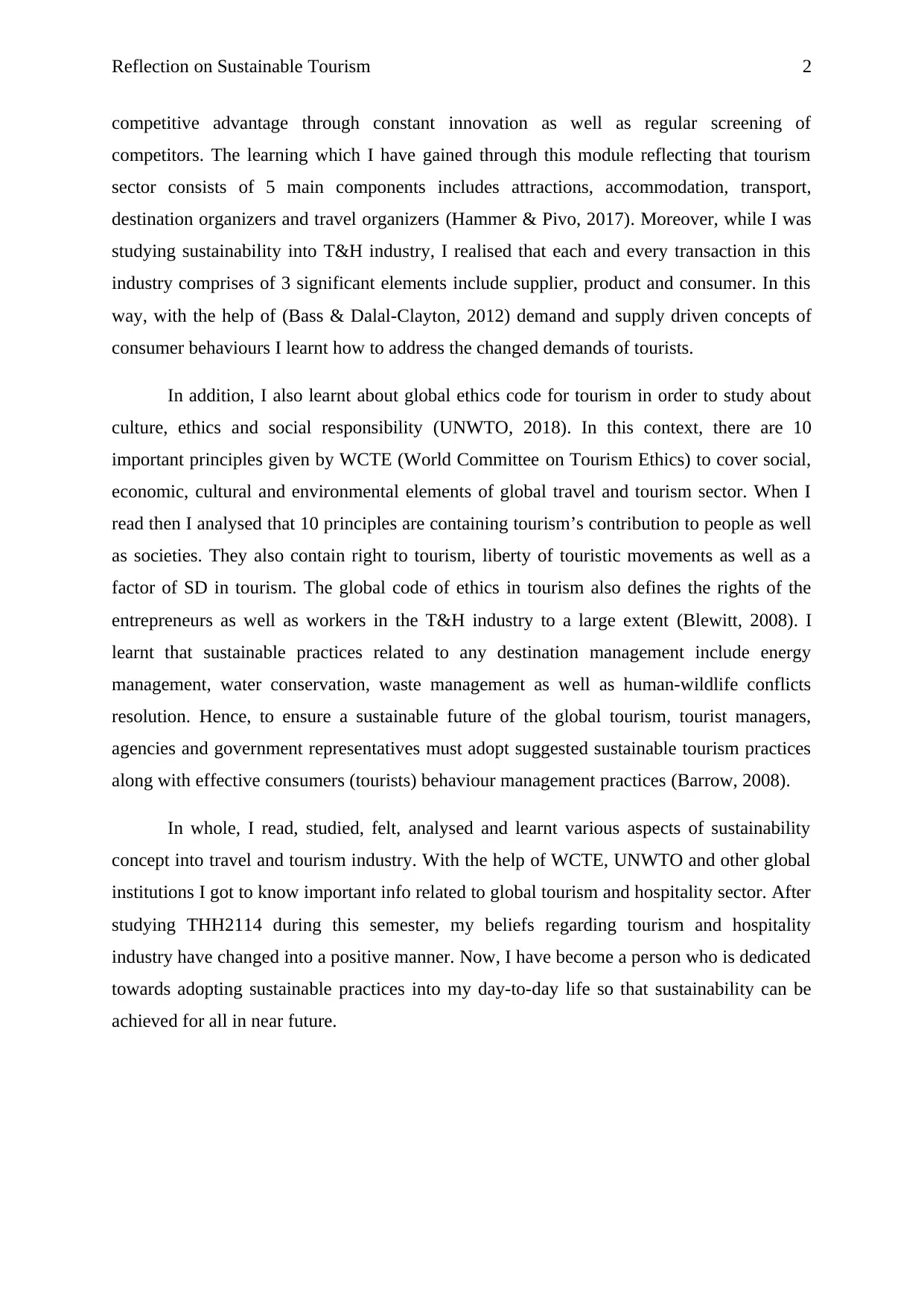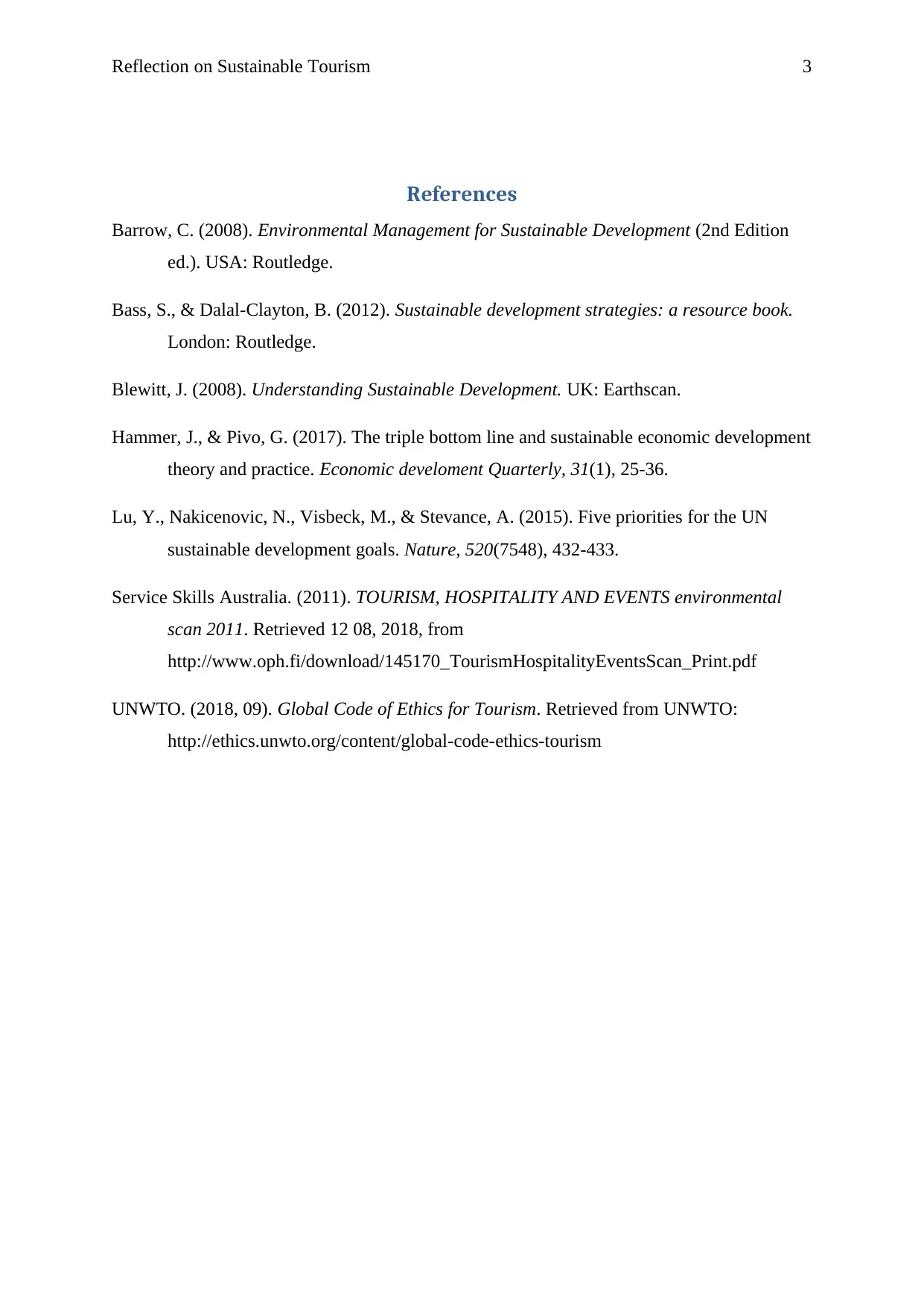THH2114 Module: Reflection on Sustainable Operations and Destinations
VerifiedAdded on 2023/04/20
|4
|1122
|115
Report
AI Summary
This reflective paper analyzes the learning acquired during the THH2114 module, focusing on sustainable practices and responsible consumption within the tourism and hospitality sector. The student reflects on the process of achieving sustainability, utilizing concepts and theories learned throughout the semester. The paper explores the application of the three pillars of sustainability (economic, environmental, and sociocultural factors) as highlighted by UNWTO, along with the triple bottom line and 3P's approach. The student also reflects on personal consumption habits, managing tourist behavior, and addressing global challenges. Insights are provided on sustainable destination management practices, including energy and waste management. The paper concludes with a positive shift in perspective towards adopting sustainable practices in daily life, aiming for a sustainable future for all, referencing key resources such as Barrow, Bass & Dalal-Clayton, Blewitt, Hammer & Pivo, Lu, Nakicenovic, Visbeck, & Stevance, Service Skills Australia and UNWTO.

Running Head: REFLECTION ON SUSTAINABLE TOURISM 0
Reflection
Reflection: Sustainable Operations and Destinations
(Student details :)
2/8/2019
Reflection
Reflection: Sustainable Operations and Destinations
(Student details :)
2/8/2019
Paraphrase This Document
Need a fresh take? Get an instant paraphrase of this document with our AI Paraphraser

Reflection on Sustainable Tourism 1
Reflective Task
This reflective paper is an attempt to critically analyse the learning acquired during
THH2114 module through reflecting on insights of sustainable practices as well as
responsible consumption after studying THH2114 during this semester. I will reflect on
learning about process of achieving sustainability by using concepts as well as various
theories during the module. I will also reflect upon personal consumption within T&H sector,
as well as give insight into managing tourist behaviour along with global challenges.
While learning about sustainability concept, I realised that sustainability is strongly
connected with present as well as future. It means that whatever we all are doing at present
will reflect and add into sustainability achievement process in future. When I heard about this
concept it made me feel like sustainable development (referred as SD) and sustainability are
somewhat different as sustainability is a long-term goal and SD is the process of achieving
that long-term goal of future. I learnt about my current activities as well as their impacts
through which I got to know that my current practices and activities are sustainable or not.
Majorly, I learnt about sustainable development practices into tourism as well as
hospitality industry. Based on the theory of three pillars of sustainability, I realised why T&H
sector requires becoming more sustainable. There are so many sustainable competitive
advantages in the T&H sector, as we know that global tourism is on the verge of becoming
top revenue generating sector of the world (Lu, Nakicenovic, Visbeck, & Stevance, 2015). In
this context, I read and learnt a lot about sustainability principles given through UNWTO
which refers to the economic, environmental and sociocultural factors of tourism growth. In
my opinion, UNWTO has highlighted a major need of balancing the above mentioned three
dimensions of sustainability to ensure T&H sector’s sustainable future. I understood this
concept through the triple bottom line method as well as 3P’s approach which consists of
3P’s as People for Social equity, Profits for Economy and Planet for Environment (Hammer
& Pivo, 2017). During week-4, I learnt about five principles of SD as responsibility,
precaution, transparency, responsible citizenship and social as well as technological
innovation. My developed insights into managing global challenges and tourists behaviours
contain strategic planning and implementation to gain a competitive advantage over others.
Based on (Service Skills Australia, 2011), I learnt that, in order to manage tourists’
behaviour and global challenges, the T&H sector of any destination should sustain their
Reflective Task
This reflective paper is an attempt to critically analyse the learning acquired during
THH2114 module through reflecting on insights of sustainable practices as well as
responsible consumption after studying THH2114 during this semester. I will reflect on
learning about process of achieving sustainability by using concepts as well as various
theories during the module. I will also reflect upon personal consumption within T&H sector,
as well as give insight into managing tourist behaviour along with global challenges.
While learning about sustainability concept, I realised that sustainability is strongly
connected with present as well as future. It means that whatever we all are doing at present
will reflect and add into sustainability achievement process in future. When I heard about this
concept it made me feel like sustainable development (referred as SD) and sustainability are
somewhat different as sustainability is a long-term goal and SD is the process of achieving
that long-term goal of future. I learnt about my current activities as well as their impacts
through which I got to know that my current practices and activities are sustainable or not.
Majorly, I learnt about sustainable development practices into tourism as well as
hospitality industry. Based on the theory of three pillars of sustainability, I realised why T&H
sector requires becoming more sustainable. There are so many sustainable competitive
advantages in the T&H sector, as we know that global tourism is on the verge of becoming
top revenue generating sector of the world (Lu, Nakicenovic, Visbeck, & Stevance, 2015). In
this context, I read and learnt a lot about sustainability principles given through UNWTO
which refers to the economic, environmental and sociocultural factors of tourism growth. In
my opinion, UNWTO has highlighted a major need of balancing the above mentioned three
dimensions of sustainability to ensure T&H sector’s sustainable future. I understood this
concept through the triple bottom line method as well as 3P’s approach which consists of
3P’s as People for Social equity, Profits for Economy and Planet for Environment (Hammer
& Pivo, 2017). During week-4, I learnt about five principles of SD as responsibility,
precaution, transparency, responsible citizenship and social as well as technological
innovation. My developed insights into managing global challenges and tourists behaviours
contain strategic planning and implementation to gain a competitive advantage over others.
Based on (Service Skills Australia, 2011), I learnt that, in order to manage tourists’
behaviour and global challenges, the T&H sector of any destination should sustain their

Reflection on Sustainable Tourism 2
competitive advantage through constant innovation as well as regular screening of
competitors. The learning which I have gained through this module reflecting that tourism
sector consists of 5 main components includes attractions, accommodation, transport,
destination organizers and travel organizers (Hammer & Pivo, 2017). Moreover, while I was
studying sustainability into T&H industry, I realised that each and every transaction in this
industry comprises of 3 significant elements include supplier, product and consumer. In this
way, with the help of (Bass & Dalal-Clayton, 2012) demand and supply driven concepts of
consumer behaviours I learnt how to address the changed demands of tourists.
In addition, I also learnt about global ethics code for tourism in order to study about
culture, ethics and social responsibility (UNWTO, 2018). In this context, there are 10
important principles given by WCTE (World Committee on Tourism Ethics) to cover social,
economic, cultural and environmental elements of global travel and tourism sector. When I
read then I analysed that 10 principles are containing tourism’s contribution to people as well
as societies. They also contain right to tourism, liberty of touristic movements as well as a
factor of SD in tourism. The global code of ethics in tourism also defines the rights of the
entrepreneurs as well as workers in the T&H industry to a large extent (Blewitt, 2008). I
learnt that sustainable practices related to any destination management include energy
management, water conservation, waste management as well as human-wildlife conflicts
resolution. Hence, to ensure a sustainable future of the global tourism, tourist managers,
agencies and government representatives must adopt suggested sustainable tourism practices
along with effective consumers (tourists) behaviour management practices (Barrow, 2008).
In whole, I read, studied, felt, analysed and learnt various aspects of sustainability
concept into travel and tourism industry. With the help of WCTE, UNWTO and other global
institutions I got to know important info related to global tourism and hospitality sector. After
studying THH2114 during this semester, my beliefs regarding tourism and hospitality
industry have changed into a positive manner. Now, I have become a person who is dedicated
towards adopting sustainable practices into my day-to-day life so that sustainability can be
achieved for all in near future.
competitive advantage through constant innovation as well as regular screening of
competitors. The learning which I have gained through this module reflecting that tourism
sector consists of 5 main components includes attractions, accommodation, transport,
destination organizers and travel organizers (Hammer & Pivo, 2017). Moreover, while I was
studying sustainability into T&H industry, I realised that each and every transaction in this
industry comprises of 3 significant elements include supplier, product and consumer. In this
way, with the help of (Bass & Dalal-Clayton, 2012) demand and supply driven concepts of
consumer behaviours I learnt how to address the changed demands of tourists.
In addition, I also learnt about global ethics code for tourism in order to study about
culture, ethics and social responsibility (UNWTO, 2018). In this context, there are 10
important principles given by WCTE (World Committee on Tourism Ethics) to cover social,
economic, cultural and environmental elements of global travel and tourism sector. When I
read then I analysed that 10 principles are containing tourism’s contribution to people as well
as societies. They also contain right to tourism, liberty of touristic movements as well as a
factor of SD in tourism. The global code of ethics in tourism also defines the rights of the
entrepreneurs as well as workers in the T&H industry to a large extent (Blewitt, 2008). I
learnt that sustainable practices related to any destination management include energy
management, water conservation, waste management as well as human-wildlife conflicts
resolution. Hence, to ensure a sustainable future of the global tourism, tourist managers,
agencies and government representatives must adopt suggested sustainable tourism practices
along with effective consumers (tourists) behaviour management practices (Barrow, 2008).
In whole, I read, studied, felt, analysed and learnt various aspects of sustainability
concept into travel and tourism industry. With the help of WCTE, UNWTO and other global
institutions I got to know important info related to global tourism and hospitality sector. After
studying THH2114 during this semester, my beliefs regarding tourism and hospitality
industry have changed into a positive manner. Now, I have become a person who is dedicated
towards adopting sustainable practices into my day-to-day life so that sustainability can be
achieved for all in near future.
⊘ This is a preview!⊘
Do you want full access?
Subscribe today to unlock all pages.

Trusted by 1+ million students worldwide

Reflection on Sustainable Tourism 3
References
Barrow, C. (2008). Environmental Management for Sustainable Development (2nd Edition
ed.). USA: Routledge.
Bass, S., & Dalal-Clayton, B. (2012). Sustainable development strategies: a resource book.
London: Routledge.
Blewitt, J. (2008). Understanding Sustainable Development. UK: Earthscan.
Hammer, J., & Pivo, G. (2017). The triple bottom line and sustainable economic development
theory and practice. Economic develoment Quarterly, 31(1), 25-36.
Lu, Y., Nakicenovic, N., Visbeck, M., & Stevance, A. (2015). Five priorities for the UN
sustainable development goals. Nature, 520(7548), 432-433.
Service Skills Australia. (2011). TOURISM, HOSPITALITY AND EVENTS environmental
scan 2011. Retrieved 12 08, 2018, from
http://www.oph.fi/download/145170_TourismHospitalityEventsScan_Print.pdf
UNWTO. (2018, 09). Global Code of Ethics for Tourism. Retrieved from UNWTO:
http://ethics.unwto.org/content/global-code-ethics-tourism
References
Barrow, C. (2008). Environmental Management for Sustainable Development (2nd Edition
ed.). USA: Routledge.
Bass, S., & Dalal-Clayton, B. (2012). Sustainable development strategies: a resource book.
London: Routledge.
Blewitt, J. (2008). Understanding Sustainable Development. UK: Earthscan.
Hammer, J., & Pivo, G. (2017). The triple bottom line and sustainable economic development
theory and practice. Economic develoment Quarterly, 31(1), 25-36.
Lu, Y., Nakicenovic, N., Visbeck, M., & Stevance, A. (2015). Five priorities for the UN
sustainable development goals. Nature, 520(7548), 432-433.
Service Skills Australia. (2011). TOURISM, HOSPITALITY AND EVENTS environmental
scan 2011. Retrieved 12 08, 2018, from
http://www.oph.fi/download/145170_TourismHospitalityEventsScan_Print.pdf
UNWTO. (2018, 09). Global Code of Ethics for Tourism. Retrieved from UNWTO:
http://ethics.unwto.org/content/global-code-ethics-tourism
1 out of 4
Related Documents
Your All-in-One AI-Powered Toolkit for Academic Success.
+13062052269
info@desklib.com
Available 24*7 on WhatsApp / Email
![[object Object]](/_next/static/media/star-bottom.7253800d.svg)
Unlock your academic potential
Copyright © 2020–2026 A2Z Services. All Rights Reserved. Developed and managed by ZUCOL.





